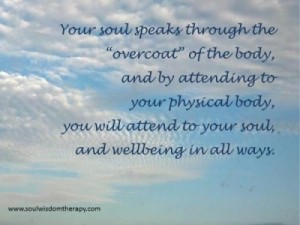The relationship between mood and food is complex and interactive, and has been extensively studied and examined for decades. Your mood can influence what and when you eat, however the converse is also true – what and when you eat influences how you feel. One key is to be attentive to the body’s cues without judgment.
 True mindfulness, being present right now in this moment, will help guide you to good eating habits. When you feel discomfort, be still for a moment, close your eyes, and ask yourself what you need right now. You may be tired, restless, frustrated, thirsty, or hungry.When you discern your body truly is hungry, it is beneficial to eat foods in line with what your body’s wisdom tells you. Ask whether your body is craving something that will deplete you (sugar, salt, caffeine, etc.) or nourish you (greens, fruit, etc.). And if you crave something that may seem “bad” for you, go deeper: why are you craving it?
True mindfulness, being present right now in this moment, will help guide you to good eating habits. When you feel discomfort, be still for a moment, close your eyes, and ask yourself what you need right now. You may be tired, restless, frustrated, thirsty, or hungry.When you discern your body truly is hungry, it is beneficial to eat foods in line with what your body’s wisdom tells you. Ask whether your body is craving something that will deplete you (sugar, salt, caffeine, etc.) or nourish you (greens, fruit, etc.). And if you crave something that may seem “bad” for you, go deeper: why are you craving it?
If you want to indulge in a huge bowl of ice cream, might you be tired and need a nap (or meditation, or deep breathing)? If you crave potato chips, might you be bored and need a quick break? Does your body need an energy boost? What can you do to provide what is lacking in a healthy way? Take a walk? Drink a large glass of water? Eat an apple? Do something like a puzzle to keep your hands busy?
There is also a great deal of information available that guides us on what a craving really means. Some theorize that the food you crave is a form of “code” that can be deciphered. You may be lacking in certain trace minerals or other nutrients.
Provide the body what it needs in the moment. Your soul speaks through the “overcoat” of the body, and by attending to your physical body, you will attend to your soul, and wellbeing in all ways.
